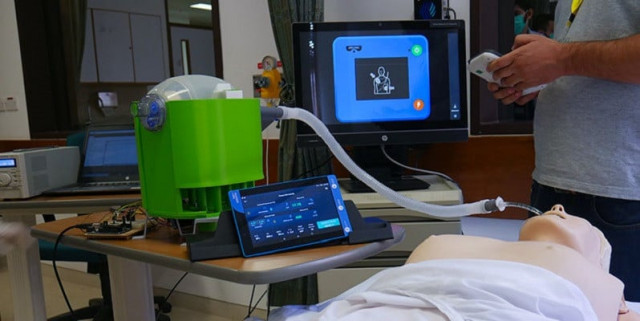AKU hackathon's portable ventilator receives US patent
Briefcase-sized, low cost ventilator can be operated remotely through a mobile application as well

A portable, briefcase-sized and low cost ventilator developed at the Aga Khan University (AKU) has received a patent from the United States Patent and Trademark Office.
According to a statement published at the AKU’s website on August 31, the ventilator was developed by Pakistani doctors, biomedical engineers and software developers at the university hospital's first hackathon.
“Patients facing breathing difficulties continue to face delays in receiving care due to two deficits in the clinical environment,” said Saleem Sayani, director of the Technology Innovation Support Centre and Digital Health Resource Centre at AKU.
“There is a shortage of trained personnel who can effectively operate manually pumped ambu bags for moderately ill patients, and there is also a lack of high-end ventilators for critically ill patients,” he said.
The Resuscitation Automation Device or RAD aims to act as a bridge between manually operated ambu bags – that can be difficult, unreliable and distressing to use – and expensive ventilators, that can have long waiting times, the website stated.
“Since the RAD is compact enough to fit in an ambulance, moderately ill patients can also potentially access care while on the way to the hospital. Critically ill patients can also be put on the RAD while they wait for a ventilator to become available,” the AKU further stated.
Read Healthcare at your fingertips
"Too many precious lives are lost due to lack of timely ventilation. When available, many ventilators are too complex to operate; too expensive; and need a significant power source.
"Patients with infections, head injury, drug overdose, heart conditions all have medical emergencies in which lives can be saved, especially at frontline healthcare facilities and during transport,” added Dr Junaid Razzak, director of AKU’s Center of Excellence for Trauma and Emergencies.
Furthermore, the device can be operated remotely through a mobile application which would help doctors monitor the patient in the ambulance to ensure that they reach the hospital in a stable condition.
“The use of low-cost mobile ventilators in ambulances coupled with remote monitoring from the hospital through mobile technologies has the potential to significantly improve patient outcomes and increase chances of survival, particularly in low-resource countries like Pakistan,” said Asad Latif, chair at Department of Anaesthesiology at AKU .


















COMMENTS
Comments are moderated and generally will be posted if they are on-topic and not abusive.
For more information, please see our Comments FAQ